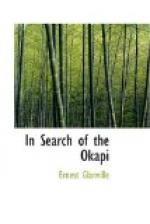Mr. Hume stretched himself forward under the awning after unstopping the mast; and the two friends, after tossing a bucket of water over the canvas awning, took their seats, clad in pyjamas and body-belts only, and bent gaily to the levers which “click-clanked” merrily. Their feet were naked, for Mr. Hume had taught the lesson that the feet should be cool and the head protected; their arms were bare to the elbow, of a fine mahogany hue; their movements were brisk; but the best evidence of health was in the clearness of their eyes. Fever shows its touch in the “gooseberry” eye, dull and clouded; in the moist pallor of the skin, and in a general listlessness. Even if they are free from fever, white men in Central Africa often grow listless because of insufficient nutriment. Their flesh-diet is chiefly the white meat of birds, and their blood-cells are really starved by the small amount of nitrogenous matter. A deficient diet in its turn is a frequent cause of diarrhoea and constipation, two of the most common complaints among new chums. In his hunting expeditions Mr. Hume had learnt his lesson from experience, and he accordingly was a martinet on the rules of health. All the drinking-water was first boiled. The boys could wear as little as they liked during the heat of the day, so long as they protected their heads and necks, but on the approach of evening they had to get into warm and dry under-garments; they had to keep a sharp watch for the striped “anophele” mosquito, were taught to spray the puncture, if they were tapped by the mosquito lancet, with chloride of ethyl, and had to submit occasionally to a hypodermic injection of quinine. The nitrogen they got from condensed meat juices.
“This is very much more like what I expected,” said Venning, looking from the broad river to the distant wooded banks, and from the dark forest to the blue sky.
“I can see two string of duck, a whole crowd of ibis on a little island, a crocodile and a hippo.”
Compton, who was facing the stern, glanced over his shoulder, then directed his gaze aft again.
“We seem to be traveling slowly,” he growled.
“There’s no hurry, is there?”
Compton raised his head a little, and looked under the shelter of a hand.
“They’re coming,” he said briefly.
“Eh?” Venning stopped, and looked back. The water glimmered under the sun like a vast silver sheet. “I can see nothing.”
“Don’t you see a dark smudge. Well, that is the smoke from a steamer. I thought at first it came from a land-fire. But it does not. Send her along.”
Venning quickened up, and for some minutes pedals and levers worked at almost racing speed.
“We cannot keep this up. Give him a call!” Venning shouted, and Mr. Hume looked round.
“Bid you call?”
“They are after us,” and Venning jerked his head back, while still bending to his work.
The hunter loosened the canvas awning, and stood up for a long look aft. Then he faced about, and threw a quick glance up-river.




